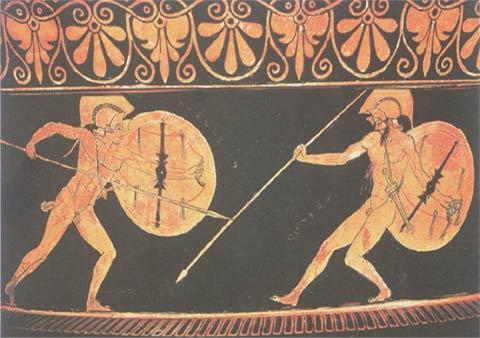II. Dorian Invasion/Dark Ages
III. Background to the Iliad
A. The Iliad as an historical source
IV. Greatness of the Iliad (On First Looking in to Chapman's Homer )
A. Poetic technique (Iambic hexameter--six feet per line/two syllables per foot, three if two are short)
1. Possible patterns: --/--/--/--/--/-- ; ^^-/--/^^-/--/^^-/-- etc.
2. Imagery
B. World it evokes
C. Story it tells
D. What it says about human nature
V. How like a Bible
A. History
B. Info. on how to relate to gods
C. Examples (zero to hero/hero to zero stories)
D. Instruction for facing tough issues in life
1. War
2. Anger
3. Death
4. Misfortune
5. Sports (!)
6. Advice for women and on how to treat women
VI. How a strange Bible
A. Gods intervene in battle, but can't be trusted
B. Gods cheat at races
C. Gods less admirable than men
| MUCH have I travell'd in the realms of gold, | ||
| And many goodly states and kingdoms seen; | ||
| Round many western islands have I been | ||
| Which bards in fealty to Apollo hold. | ||
| Oft of one wide expanse had I been told | ||
| That deep-brow'd Homer ruled as his demesne: | ||
| Yet did I never breathe its pure serene | ||
| Till I heard Chapman speak out loud and bold: | ||
| Then felt I like some watcher of the skies | ||
| When a new planet swims into his ken; | ||
| Or like stout Cortez, when with eagle eyes | ||
| He stared at the Pacific—and all his men | ||
| Look'd at each other with a wild surmise— | ||
| Silent, upon a peak in Darien. |
--John Keats (1795-1821)
